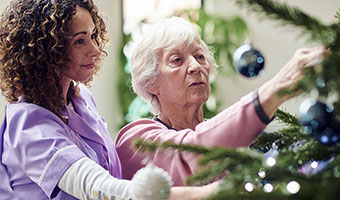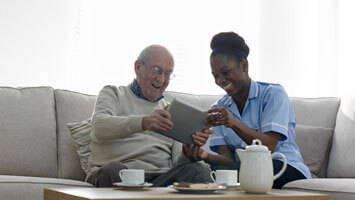Be Proactive, Stay On Top of Your Elderly Parent’s Care
Today, it’s more common than ever for families and friends to live long distances away from each other, including from their aging parents.
Whether the children have relocated for work or the senior has retired to a resort community, in these situations, it may be that you don’t get to spend as much time together as you’d like. A visit every few months and a daily phone call can show your loved one that you care, but you may be missing crucial signs that they need more help than you had realized.
A small dent in their car, a refrigerator full of spoiled food or a bruise from a fall they’re too proud to admit could all be warning signs of underlying problems that you’re not able to see over the phone.
Face-to-face interaction tends to remove the veil masking independence. That’s why most professional caregivers are hired at or around the holidays. But in many cases, the problems don’t begin during the holidays. That’s just when most people finally notice them.
Stay On Top of Your Elderly Parent's Care
Unfortunately, its inevitable that a person’s fine motor skills will decrease as he or she ages. The changes can happen slowly or rapidly. This could make it hard for a senior to do everyday tasks that he or she has taken for granted, such as preparing food or dealing with fasteners on clothes.
Here are a few other things you can’t see over the phone, but all of which could be signs that your loved one needs more care to live safely, comfortably and happily at home:
- Changes in sleep — more or less
- Changes in eating — skipped meals and lost weight
- Changes in clothing — wrinkled, mismatched, backward or misbuttoned shirts
- Changes in grooming and personal hygiene — unpleasant body odor, bad breath, strong smell of urine in the house or on the clothing
- Decline in household maintenance — dishes piling up, unopened envelopes, unpaid bills
- Trouble standing up from a seat
- Failing to take their medications at the correct time or totally forgetting to take their medications
- Dropped pills, because they can be difficult for a senior to spot and pick up (and missing doses of prescribed medication can cause even minor health problems to worsen)
Replace Doubt With Expertise
Hiring a professional caregiver is an increasingly popular way to help your parents maintain their independence in their own home. The caregiver will inevitably build a relationship with your loved one through the actions of going into his or her home to help with daily tasks — like assistance with hygiene, dressing or toileting, as well as meal preparation,light housekeeping and grocery shopping.
If your loved one loves to cook but has trouble standing that long or carrying in groceries, a caregiver can help with that, too — driving to the grocery, carrying the bags in and acting like an assistant in the kitchen.
The caregiver can also be an additional part of your care team and family, so you can have peace of mind about your loved one’s health from afar.
Even if you live close to your loved one, it may be that a professional caregiver can spot warning signs that an untrained eye might miss, particularly related to dementia. There are small signs that can indicate problems, like little memory lapses or difficulty with numbers.
Being proactive with your elderly loved one’s care now can help to avoid problems later. And in doing so, you’ll keep everyone happy during the holidays.













